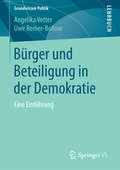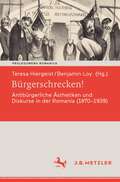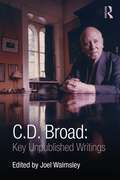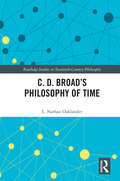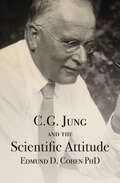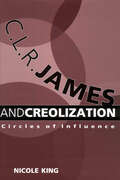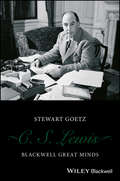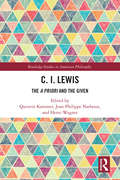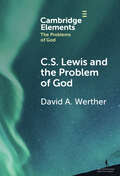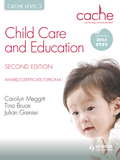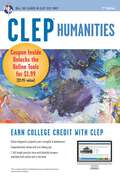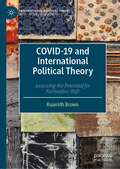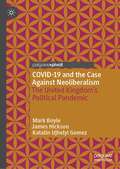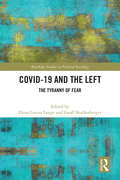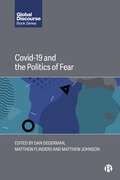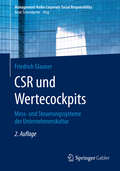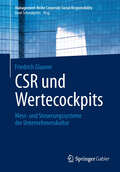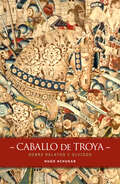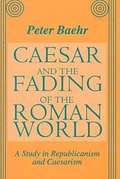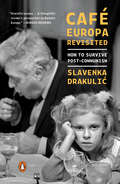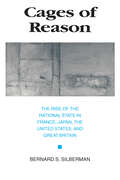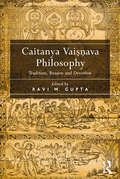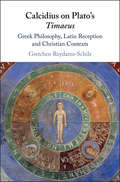- Table View
- List View
Bürger und Beteiligung in der Demokratie: Eine Einführung (Grundwissen Politik)
by Angelika Vetter Uwe Remer-BollowDas Lehrbuch richtet sich an Studierende und Lehrende, die sich mit B#65533;rgerbeteiligung und politischer Partizipation in Deutschland und anderen Demokratien besch#65533;ftigen. Dazu geh#65533;ren unter anderem Wahlen, B#65533;rger und Volksentscheide, informelle Formen der Beteiligung. Das Buch bietet einen umfassenden #65533;berblick #65533;ber die demokratietheoretischen Grundlagen, die institutionellen Rahmenbedingungen und die relevanten Theorien zur Erkl#65533;rung von Beteiligung. Dabei werden die wichtigsten Formen der politischen Partizipation und B#65533;rgerbeteiligung hinsichtlich ihrer theoretischen und strukturellen Eigenschaften einzeln dargestellt. Zahlreiche empirische Daten und Interpretationen erg#65533;nzen die Ausf#65533;hrungen und vermitteln ein aktuelles Bild der Beteiligungslandschaft.
Bürgerbeteiligung an der Verwaltung am Beispiel der Hamburgischen Deputationen: Veraltete Beteiligungsform oder bewährtes Mitwirkungsinstrument
by Stephan MeynDieses Buch beleuchtet das althergebrachte Verwaltungsgremium der Hamburgischen Deputationen im verwaltungswissenschaftlichen, historischen, rechts- sowie politikwissenschaftlichen Kontext. Als zentrale Frage wird untersucht, ob die Deputationen in ihrer bis zum Ende der 21. Legislaturperiode bestehenden Form ihre Daseinsberechtigung hatten, welchen historischen Ursprungs sie waren, welchen Reformbedarf es gab und ob sie der Verfassungsvorgabe in Artikel 56 der Hamburgischen Verfassung (a. F.), das Volk an der Verwaltung mitwirken zu lassen, entsprachen. Hierzu wird einerseits eine umfassende quantitative Erhebung mit Hilfe eines standardisierten Fragebogens unter den Deputierten durchgeführt und durch eine qualitative Erhebung in Form von Leitfadeninterviews ergänzt. Andererseits werden die historischen Wurzeln seit dem späten Mittelalter und die Entwicklungen bis zur Gegenwart herausgearbeitet sowie die Rechtslage vor dem Hintergrund der Verfassungsgeschichte und -wirklichkeit auch im Vergleich zu anderen deutschen Ländern dargestellt.
Bürgerschrecken!: Antibürgerliche Ästhetiken und Diskurse in der Romania (1870-1939) (Prolegomena Romanica. Beiträge zu den romanischen Kulturen und Literaturen)
by Teresa Hiergeist Benjamin LoyDer Band untersucht ästhetische und diskursive Formen, die in der Moderne an die Kritik des Bürgerlichen geknüpft sind. Der Fokus richtet sich auf Beispiele aus Frankreich, Italien und Spanien sowie aus Lateinamerika. Diese kulturvergleichende Perspektive auf Dimensionen von Antibürgerlichkeit eröffnet neue Lesarten eines zentralen Themas der Moderne. Die Bandbreite der Analysen umfasst die ästhetischen Dimensionen von anarchistischen Reformdiskursen und reaktionären Gesellschaftsentwürfen ebenso wie von Modellen einer christlichen Kapitalismuskritik oder der revolutionären Programme der Avantgarden. Vor dem Hintergrund eines Wiedererstarkens antibürgerlicher Formationen in der Gegenwart bietet der Band eine historisch-kritische Diskussion alternativer Sozialimaginationen jenseits der bürgerlichen Gesellschaft.
C. D. Broad: Key Unpublished Writings
by C. D. BroadC. D. Broad (1887–1971) was a British philosopher who taught for many years at Trinity College, Cambridge. Possessing extremely wide-ranging interests, Broad made significant contributions to the mind-body problem, perception, memory, introspection, the unconscious, the nature of space, time, and causation. He also wrote extensively on the philosophy of science, ethics, the history of philosophy, and the philosophy of religion and had an abiding interest in ‘psychical research’—a subject he approached with the disinterested curiosity and scrupulous care that is characteristic of his philosophical work. Whilst overshadowed in his own time by figures such as Russell, Moore, and Wittgenstein, he is acknowledged to have anticipated important developments in several fields, such as emergence in philosophy of science, sense perception, and the 'growing block' theory of time in metaphysics. Although Broad published many books in his lifetime, this volume is unique in presenting some of his most interesting unpublished writings. Divided into five clear sections, the following figures and topics are covered: Autobiography Hegel and the nature of philosophy Francis Bacon Hume's philosophy of the self and belief F. H. Bradley The historical development of scientific thought from Pythagoras to Newton Causation Change and continuity Quantitative methods Poltergeists Paranormal phenomena. Each section is introduced and placed in context by the editor, Joel Walmsley. The volume also includes an engaging and informative foreword by Simon Blackburn. It will be of great value to those studying and researching the history of twentieth-century philosophy, metaphysics, and the recent history and philosophy of science, as well as anyone interested in Broad's philosophical thought and his place in the history of philosophy.
C. D. Broad’s Philosophy of Time (Routledge Studies in Twentieth-Century Philosophy)
by L. Nathan OaklanderIn this study, Oaklander's primary aim is to examine critically C.D. Broad’s changing views of time and in so doing clarify the central disputes in the philosophy of time, explicate the various positions Broad took regarding them, and develop his own responses both to Broad and the issues debated.
C. G. Jung and the Scientific Attitude
by Edmund D. CohenThis probing study of the pioneering psychologist dispels many of the popular misconceptions about his work. Though Carl Jung is well known as one of the great pioneers of psychology and psychoanalysis, there are many persistent misconceptions about his work and legacy. Jungian psychology is rigorously scientific, yet its critics dismiss it as obscure and mystical. In C. G. Jung and the Scientific Attitude, Edmund D. Cohen sheds light on significant aspects of Jung&’s work that academic psychology has previously all but overlooked. Though Jung&’s productivity spanned more than fifty years, his reputation rests largely on statements he made early in his career—statements upon which he later improved. In this fascinating and enlightening analysis, Cohen explores these statements and the misunderstandings they have caused. He also looks at the many paradoxes of Jungian psychology, showing that what first appears to be merely contradictory turn out to reveal a deeper meaning.
C. L. R. James and Creolization: Circles of Influence
by Nicole KingC. L. R. James (1901–1989), one of the most important intellectuals of the twentieth century, expressed his postcolonial and socialist philosophies in fiction, speeches, essays, and book-length scholarly discourses. However, the majority of academic attention given to James keeps the diverse mediums of James's writing separate, focuses on his work as a political theorist, and subordinates his role as a fiction writer. This book, however, seeks to change such an approach to studying James. Defining creolization as a process by which European, African, Amerindian, Asian, and American cultures are amalgamated to form new hybrid identities and cultures, Nicole King uses this process as a means to understanding James's work and life. She argues that, throughout his career, whether writing a short story or a political history, James articulated his attempt to produce revolutionary, radical discourses with a consistent methodology. James, a Trinidad-born scholar who migrated to England and then to the United States and who described himself both as a black radical and a Victorian intellectual, serves as a definitive model of creolization. King argues that James's writings also fit the model of creolization, for each is influenced by diverse types of discourses. James rarely wrote from within the confines of a single discipline, instead choosing to make the layers of history, literature, philosophy, and political theory coalesce in order to make his point. As his West Indian and Western European influences converge in his work and life, he creates texts that are difficult to confine to a specific category or discipline. No matter which writerly medium he uses, James was preoccupied with how to represent the individual personality and at the same time represent the community. The C. L. R. James that emerges from King's study is a man made more compelling and more human because of his complicated, multilayered, and sometimes contradictory allegiances.
C. S. Lewis: Why It Did Not Include Rome (Blackwell Great Minds)
by Stewart GoetzThe definitive exploration of C.S. Lewis’s philosophical thought, and its connection with his theological and literary work Arguably one of the most influential writers of the twentieth century, C.S. Lewis is widely hailed as a literary giant, his seven-volume Chronicles of Narnia having sold over 65 million copies in print worldwide. A prolific author and scholar whose intellectual contributions transcend the realm of children’s fantasy literature, Lewis is commonly read and studied as a significant theological figure in his own right. What is often overlooked is that Lewis first loved and was academically trained in philosophy. In this newest addition to the Blackwell Great Minds series, well-known philosopher and Lewis authority Stewart Goetz discusses Lewis’s philosophical thought and illustrates how it informs his theological and literary work. Drawing from Lewis’s published writing and private correspondence, including unpublished materials, C.S. Lewis is the first book to develop a cohesive and holistic understanding of Lewis as a philosopher. In this groundbreaking project, Goetz explores how Lewis’s views on topics of lasting interest such as happiness, morality, the soul, human freedom, reason, and imagination shape his understanding of myth and his use of it in his own stories, establishing new connections between Lewis’s philosophical convictions and his wider body of published work. Written in a scholarly yet accessible style, this short, engaging book makes a significant contribution to Lewis scholarship while remaining suitable for readers who have only read his stories, offering new insight into the intellectual life of this figure of enduring popular interest.
C.I. Lewis: The A Priori and the Given (Routledge Studies in American Philosophy)
by Quentin Kammer; Jean-Philippe Narboux; Henri WagnerThis edited collection explores the philosophy of Clarence Irving Lewis through two major concepts that are integral to his conceptual pragmatism: the a priori and the given. The relation between these two elements of knowledge form the core of Lewis’s masterpiece Mind and the World-Order. While Lewis’s conceptual pragmatism is directed against any conception of the a priori as constraining the mind and experience, it also emphasizes the inalterability and the unavoidability of the given that remains the same through any interpretation of it by the mind. The essays in this volume probe Lewis’s new account of the relation between the a priori and the given in dialogue with other notable figures in 20th-century philosophy, including Carnap, Friedman, Goodman, Putnam, Quine, Russell, Sellars, and Sheffer. C.I. Lewis represents a focused treatment of a long-neglected figure in 20th-century American philosophy.
C.S. Lewis and the Problem of God (Elements in the Problems of God)
by David WertherUnderstanding C.S. Lewis's vocation is essential for reading his works well, as is knowing how he came to it: his long and winding philosophical journey and reoccurring experiences of 'Joy.' Lewis discounted 'proofs' in philosophical theology but offered key arguments in support of theism per se, and Christianity in particular. His account of “mere Christianity” shows the centrality of self-determination, an emphasis on Christ's human nature, and a relativizing of atonement theories. Finally, Lewis's understanding of faith, his attempts to make sense of petitionary and imprecatory prayers, and his emphasis on theosis/deification, are considered.
C.S. Lewis on Politics and the Natural Law
by Justin Buckley Dyer Micah J. WatsonConventional wisdom holds that C. S. Lewis was uninterested in politics and public affairs. The conventional wisdom is wrong. As Justin Buckley Dyer and Micah J. Watson show in this groundbreaking work, Lewis was deeply interested in the fundamental truths and falsehoods about human nature and how these conceptions manifest themselves in the contested and turbulent public square. Ranging from the depths of Lewis' philosophical treatments of epistemology and moral pedagogy to practical considerations of morals legislation and responsible citizenship, this book explores the contours of Lewis' multi-faceted Christian engagement with political philosophy generally and the natural-law tradition in particular. Drawing from the full range of Lewis' corpus and situating his thought in relationship to both ancient and modern seminal thinkers, C. S. Lewis on Politics and the Natural Law offers an unprecedented look at politics and political thought from the perspective of one of the twentieth century's most influential writers.
CACHE Level 3 Child Care and Education, 2nd Edition
by Tina Bruce Carolyn Meggitt Julian GrenierExclusively published in partnership with CACHE and up-to-date with the 2012 EYFS requirements, this is the ideal textbook for you if you are taking the Award, Certificate or Diploma in the CACHE Level 3 Child Care and Education qualification.Written by a highly experienced and respected author team, this book focuses on the knowledge and skills you will need to obtain the qualification, and will support you through your assessment and the start of your career.Key features in this edition:* Up-to-date with the requirements of the revised 2012 EYFS* Focused and clear coverage from authors who are respected experts means you can trust the content and know that it is the key information that you need for the course* Case studies and Practice Tips show you exactly how you can use the knowledge and concepts when you are working* Progress Check and In Practice features make sure that you have the necessary understanding and preparation to pass your course* An easy-to-read and friendly writing style keeps the book enjoyable and accessible for all students* Key Terms features throughout the text for easy reference.
CLEP® Humanities Book + Online (CLEP Test Preparation)
by Robert Liftig Marguerite BarrettEarn College Credit with REA’s Test Prep for CLEP Humanities Everything you need to pass the exam and get the college credit you deserve. REA leads the way in helping students pass their College Board CLEP exams and earn college credit while reducing their tuition costs. With 25+ years of experience in test prep for the College-Level Examination Program (CLEP), REA is your trusted source for the most up-to-date test-aligned content. Whether you’re an adult returning to finish your degree, a traditional-age college student, a military service member, or a high school or home-schooled student looking to get a head start on college and shorten your path to graduation, CLEP is perfect for you. REA’s expert authors know the CLEP tests inside out. And thanks to our partners at Proctortrack (proctortrack.com/clep), you can now take your exam at your convenience, from the comfort of home. Prep for success on the CLEP Humanities exam with REA’s personalized three-step plan: (1) focus your study, (2) review with the book, and (3) measure your test-readiness. Our Book + Online prep gives you all the tools you need to make the most of your study time: Diagnostic exam: Pinpoint what you already know and what you need to study.Targeted subject review: Learn what you’ll be tested on.Two full-length practice exams: Zero in on the topics that give you trouble now so you’ll be confident and prepared on test day.Glossary of key terms: Round out your prep with must-know vocabulary.REA is America’s recognized leader in CLEP preparation. Our test prep helps you earn valuable college credit, save on tuition, and accelerate your path to a college degree.
COVID-19 and International Political Theory: Assessing the Potential for Normative Shift (International Political Theory)
by Ruairidh BrownThe COVID-19 pandemic is an international event whose impact has been acutely felt by almost everyone across the globe. Indeed, currently reading this, it is highly unlikely that your own life has not been significantly impacted by COVID-19. This book offers one of the first analysis of the COVID-19 pandemic and its potential impact from the perspective of International Political Theory. It promises normative interpretation and analysis of the COVID-19 pandemic and to map potential political orders that may emerge in the post-pandemic world. It seeks to give initial insight into how the shockwaves from this event will impact upon our political and international norms. The book focuses on the normative questions of: can emergency powers be used to preserve society from the virus without necessitating a transition to more authoritarian political norms? Will COVID-19 prove a catalyst for Chinese Socialism to challenge, and potentially usurp, liberalism as the dominant international political norm? What changes to liberalism ought to be made as a result of the pandemic? What direction should liberalism take in the post-pandemic world?
COVID-19 and the Case Against Neoliberalism: The United Kingdom’s Political Pandemic
by Mark Boyle James Hickson Katalin Ujhelyi GomezThis book seeks to better understand the meaning and implications of the UKs calamitous encounter with the COVID-19 global pandemic for the future of British neoliberalism. Construing COVID-19 as a political pandemic and mobilising a novel applied political philosophy approach, the authors cultivate fresh intellectual resources, both analytical and normative, to better understand why the UK failed the COVID-19 test and how it might ‘fail forward’ so as to strengthen its resilience. COVID-19 they argue, has intercepted the UK government’s decades-long experimentation with neoliberalism at what appears to be a threshold moment in this model’s life course. Neoliberalism has served as a key progenitor of the country’s vulnerability: the pandemic has cruelly unveiled the failings of neoliberal logics and legacies which have placed the country at elevated risk and hampered its response. The pandemic in turn has attenuated underlying systemic maladies inherent in British neoliberalism and served as a great disruptor and potential accelerant of history; a consequential episode in the tumultuous life of this politico-economic model. To meaningfully ‘build back better’, a true renaissance of social democracy is needed. Drawing upon the neorepublican tradition of political philosophy, the authors confront neoliberalism’s hegemonic but parochial concept of human freedom as non-interference and place the neorepublican idea of freedom as non-domination in the service of building a new UK social contract. This book will be of interest to political philosophers, political geographers, medical sociologists, public-health scholars, and epidemiologists, to stakeholders engaged in the public inquiry processes now gathering momentum globally and to architects of build back better programmes, especially in western advanced capitalist economies.
COVID-19 and the Left: The Tyranny of Fear (Routledge Studies in Political Sociology)
by Elena Louisa Lange Geoff ShullenbergerThe COVID-19 pandemic and the measures introduced to purportedly contain its spread have wrought an unprecedented global social transformation.Authoritarian measures such as lockdowns, vaccine mandates, and the enforced wearing of facemasks, have led to a biopolitical disenfranchisement of human rights and the encroachment of state and corporate directives onto private lives. By supporting these measures, the left has lost sight of its traditional critique of capital, the state, and class society and has instead reinforced existing power structures in the name of ‘saving lives’. In doing so, the left has contributed to widespread suffering, especially among the ‘vulnerable’ groups in society the measures claimed to protect, particularly children, the elderly, and the poor.COVID-19 and the Left explores why the left has departed from its self-understanding as a critical force against state power, unfettered capital accumulation, the digital transformation, biopolitics, and a politics of social discrimination, and instead has largely assumed a stance in line with the neoliberal consensus. In particular, the essays in this collection explore the role of fear, panic, and psychological blackmailing as a tool of domination in late capitalist society and consider whether the left has been a victim, or an active perpetrator, of a ‘tyranny of fear’.Drawing upon approaches from various disciplines and interrogating shibboleths on the left and right, the essays in this volume consider the ideological, sociocultural, and economic implications of the historical rupture that the COVID-19 pandemic presents and instead argue for a counter-narrative to fear and its harmful consequences. This provocative collection will be of considerable interest to those with an interest in the contemporary left and the impact of the COVID-19 pandemic.
COVID-19 and the Politics of Fear (Global Discourse)
by Dan Degerman, Matthew Flinders and Matthew JohnsonThe COVID-19 pandemic thrust fear into the heart of political debate and policy making. In the wake of the pandemic, it is critical to clarify the role of fear in these processes to avoid repeating past mistakes and to learn crucial lessons for future crises. This book draws on case studies from across the world, including the UK, Turkey, Brazil and the US, to provide thought-provoking and practical insights into how fear and related emotions can shape politics under extraordinary and ordinary circumstances. Offering interdisciplinary perspectives from leading and emerging scholars in politics, philosophy, sociology and anthropology, the book enables a better understanding of post-pandemic politics for students, researchers and policy makers alike.
CSR und Wertecockpits: Mess- und Steuerungssysteme der Unternehmenskultur (Management-Reihe Corporate Social Responsibility #299)
by Friedrich GlaunerUnternehmenswerte sichern den Unternehmenserfolg. Das Wertecockpit steuert sie transparent und nachhaltig ertragssteigernd. Unternehmenswerte beeinflussen messbar den wirtschaftlichen Erfolg herausragender Unternehmen. Das Instrument des Wertecockpits gestaltet die Werte transparent. Es verknüpft betriebswirtschaftliche Ansätze zur Steuerung von Unternehmensprozessen mit interdisziplinären Forschungsergebnissen zu den Treiberkräften menschlichen Denkens und Handelns. Das Buch erläutert, wie und warum die Unternehmenskultur, individuell und nach klaren Regeln operativ gelenkt, ein signifikantes Asset wirtschaftlichen Erfolgs ist. Es zeigt, dass die Steuerung der Wertekultur ein Wertschöpfungsprozess ist, der die Grundlage für alle anderen Unternehmensprozesse bildet. Mit den Instrumenten des Wertecockpits kann er in jedem Unternehmen effizient und schlank umgesetzt werden. In der Darstellung namhafter Unternehmen und Interviews mit ihren CEOs und Gründern wird die Frage beantwortet, auf welche Weise weiche Unternehmensfaktoren einen messbaren Beitrag zur dauerhaften Leistungsfähigkeit von Unternehmen leisten. Das Wertecockpit erfasst mit seinen integralen Instrumenten des C4-Managements und der sieben Treiberfaktoren der Unternehmenskultur alle Bereiche der strategischen und operativen Unternehmensführung.
CSR und Wertecockpits: Mess- und Steuerungssysteme der Unternehmenskultur (Management-Reihe Corporate Social Responsibility)
by Friedrich GlaunerUnternehmenswerte sichern den Unternehmenserfolg.Das Wertecockpit steuert sie transparent und nachhaltig ertragssteigernd.Unternehmenswerte beeinflussen messbar den wirtschaftlichen Erfolg herausragender Unternehmen. Das Instrument des Wertecockpits gestaltet die Werte transparent. Es verknüpft betriebswirtschaftliche Ansätze zur Steuerung von Unternehmensprozessen mit interdisziplinären Forschungsergebnissen zu den Treiberkräften menschlichen Denkens und Handelns.Das Buch erläutert, wie und warum die Unternehmenskultur, individuell und nach klaren Regeln operativ gelenkt, ein signifikantes Asset wirtschaftlichen Erfolgs ist. Es zeigt, dass die Steuerung der Wertekultur ein Wertschöpfungsprozess ist, der die Grundlage für alle anderen Unternehmensprozesse bildet. Mit den Instrumenten des Wertecockpits kann er in jedem Unternehmen effizient und schlank umgesetzt werden.In der Darstellung namhafter Unternehmen und Interviews mit ihren CEOs und Gründern wird die Frage beantwortet, auf welche Weise weiche Unternehmensfaktoren einen messbaren Beitrag zur dauerhaften Leistungsfähigkeit von Unternehmen leisten. Das Wertecockpit erfasst mit seinen integralen Instrumenten des C4-Managements und der sieben Treiberfaktoren der Unternehmenskultur alle Bereiche der strategischen und operativen Unternehmensführung.
Caballo de troya: Sobre relatos y olvidos
by Hugo AchugarUn conjunto de ensayos que defienden el derecho de las voces silenciadas a sobrevivir por encima del relato hegemónico Toda cultura es un campo de batalla. Allí se dirimen cuestiones que trascienden fronteras estéticas, políticas y territoriales. Cualquier decisión en torno a ella está teñida por una distinción ideológica, construye narrativas, hace oír algunas voces y silencia otras.Hugo Achugar no elude el desafío de mirar más allá de lo aparente. Con su particular estilo escritural, que combina el oficio de poeta con la perspectiva del investigador, el docente y el intelectual, invita al lector a un recorrido que cuestiona y desafía. En estos ensayos dialoga, propone y se opone a un relato que se presenta como hegemónico detrás de la aparente pluralidad, toma posición y se compromete con una mirada cultural que incorpore y asimile la diversidad.¿Cómo se establece el relato hegemónico? ¿Con qué criterios se decide la construcción de la memoria? ¿Son las nuevas tecnologías una herramienta para el cambio o llegaron para sostener el status quo? En tiempos de redes, inteligencia artificial y descrédito hacia todo lo humano, este conjunto de ensayos es una invitación a la reflexión y a la búsqueda de posibles horizontes
Caesar and the Fading of the Roman World
by Peter BaehrA examination of 'Caesar' and Casearism in republican thought from his death until today.
Café Europa Revisited: How to Survive Post-Communism
by Slavenka DrakulicAn evocative and timely collection of essays that paints a portrait of Eastern Europe thirty years after the end of communism.An immigrant with a parrot in Stockholm, a photo of a girl in Lviv, a sculpture of Alexander the Great in Skopje, a memorial ceremony for the 50th anniversary of the Soviet led army invasion of Prague: these are a few glimpses of life in Eastern Europe today. Three decades after the Velvet Revolution, Slavenka Drakulic, the author of Cafe Europa and A Guided Tour of the Museum Of Communism, takes a look at what has changed and what has remained the same in the region in her daring new essay collection. Totalitarianism did not die overnight and democracy did not completely transform Eastern European societies. Looking closely at artefacts and day to day life, from the health insurance cards to national monuments, and popular films to cultural habits, alongside pieces of growing nationalism and Brexit, these pieces of political reportage dive into the reality of a Europe still deeply divided.
Cages Of Reason: The Rise Of The Rational State In France, Japan, The United States, And Great Britain
by Bernard S. SilbermanBlending political, historical, and sociological analysis, Bernard S. Silberman offers a provocative explanation for the bureaucratic development of the modern state. The study of modern state bureaucracy has its origins in Max Weber's analysis of the modes of social domination, which Silberman takes as his starting point. Whereas Weber contends that the administration of all modern nation-states would eventually converge in one form characterized by rationality and legal authority, Silberman argues that the process of bureaucratic rationalization took, in fact, two courses. One path is characterized by permeable organizational boundaries and the allocation of information by "professionals." The other features well-defined boundaries and the allocation of information by organizational rules. Through case studies of France, Japan, the United States, and Great Britain, Silberman demonstrates that this divergence stems from differences in leadership structure and in levels of uncertainty about leadership succession in the nineteenth century. Silberman concludes that the rise of bureacratic rationality was primarily a response to political problems rather than social and economic concerns. Cages of Reason demonstrates how rationalization can have occurred over a wide range of cultures at various levels of economic development. It will be of considerable interest to readers in a number of disciplines: political science, sociology, history, and public administration. "Silberman has produced an invaluable, densely packed work that those with deep knowledge of public administrative development will find extremely rewarding." —David H. Rosenbloom, American Political Science Review "An erudite, incisive, and vibrant book, the product of intensive study and careful reflection. Given its innovative theoretical framework and the wealth of historical materials contained in it, this study will generate debate and stimulate research in sociology, political science, and organizational theory. It is undoubtedly the best book on the comparative evolution of the modern state published in the last decade."—Mauro F. Guillen, Contemporary Sociology
Caitanya Vaisnava Philosophy: Tradition, Reason and Devotion
by Ravi M. GuptaIn the sixteenth century, the saint and scholar Sri Caitanya set in motion a wave of devotion to Krishna that began in eastern India and has now found its way around the world. Caitanya taught that the highest aim of life is to develop selfless love for God Krishna, the blue-hued cowherd boy who spoke the Bhagavad Gita. Although only a handful of poetry is attributed to Caitanya, his devotional theology was expounded and systematized by his followers in a vast array of poetical, philosophical, and ritual literature. This book provides a thematic study of Caitanya Vaishnava philosophy, introducing key thinkers and ideas in the early tradition, using Sanskrit and Bengali sources that have seldom been studied in English. The book addresses major areas of the tradition, including epistemology, ontology, aesthetics, ethics, and history, and every chapter includes relevant readings from primary sources.
Calcidius on Plato's Timaeus: Greek Philosophy, Latin Reception, and Christian Contexts
by Gretchen Reydams-SchilsThis is the first study to assess in its entirety the fourth-century Latin commentary on Plato's Timaeus by the otherwise unknown Calcidius, also addressing features of his Latin translation. The first part examines the authorial voice of the commentator and the overall purpose of the work; the second part provides an overview of the key themes; and the third part reassesses the commentary's relation to Stoicism, Aristotle, potential sources, and the Christian tradition. This commentary was one of the main channels through which the legacy of Plato and Greek philosophy was passed on to the Christian Latin West. The text, which also establishes a connection between Plato's cosmology and Genesis, thus represents a distinctive cultural encounter between the Greek and the Roman philosophical traditions, and between non-Christian and Christian currents of thought.
